|
|
|
Sort Order |
|
|
|
Items / Page
|
|
|
|
|
|
|
| Srl | Item |
| 1 |
ID:
107287
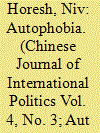

|
|
|
|
|
| Publication |
2011.
|
| Summary/Abstract |
Recent popular unrest across the Arab world has sparked fresh debate over the scope of multinational intervention in 21st-century emergent humanitarian crises and the perimeters of promoting democratization in the developing world; it has also prompted reassessment of the United States' ability to maintain its system of longstanding regional alliances in the face of economic recession at home, and amid President Obama's apparent disowning of his predecessor's ebullient pre-emptive posture.
Barack Obama's attempts to defuse visceral anti-Americanism in the Arab world have been accompanied by assurances that the United States would speed up its pull-out from Iraq and Afghanistan. Coupled with an initially less belligerent approach to Iran's nuclear program than was postulated by George W. Bush, then followed by an initially cautious reaction to the Egyptian and Libyan uprisings, Obama's foreign policy has given rise to speculations about a possible scaling-down of U.S. immersion in the Middle East in favour of focusing on domestic issues and on better managing China's rise in the Asia-Pacific region.
From Israel, through to Saudi Arabia, and Australia, allies historically vulnerable to regional isolation of various kinds observe closely the Obama Administration's reactions to the demonstrations rocking the Arab world (and Iran); analysts in these countries often wonder about the significance of Obama's professed non-belligerence to their respective national-security interests. A few on the periphery of their countries' security establishments are even propelled to speculate openly that the United States might ultimately disengage from their arena in order to focus on domestic issues, or on other parts of the world.1
Framed within this changing geo-political landscape, this article will consider the current pulses shaping the Sino-Israeli relationship against the backdrop of the great civil unrest sweeping across the Arab World. It will start by identifying the historical policy narratives that have carried over …
|
|
|
|
|
|
|
|
|
|
|
|
|
|
|
|
| 2 |
ID:
106918
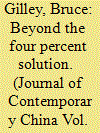

|
|
|
|
|
| Publication |
2011.
|
| Summary/Abstract |
Debates about the consequences of China's rise have focused mainly on China's foreign policy in security affairs and have been offered mostly within a realist framework; yet this limited approach to the problem ignores non-security issues, non-realist frameworks, and non-China sources of system-level outcomes. Policy-makers and scholars should significantly broaden their descriptive and explanatory frameworks in order to understand the consequences of a rising China. Using this broader approach will direct attention to systemic and ideational factors in explaining whether China's rise is peaceful or not.
|
|
|
|
|
|
|
|
|
|
|
|
|
|
|
|
| 3 |
ID:
114507
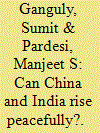

|
|
|
|
|
| Publication |
2012.
|
| Summary/Abstract |
This article provides a brief overview of the theoretical literature on the rise of China, and then explores the implications of the rise of China for the U.S.- China rivalry. It then describes sources of underlying tensions in the Sino-Indian relationship. China and India are not only engaged in a competition for power and influence in Asia, but they are also locked in a particularly contentious border dispute. The authors then argue that economic interdependence may not be enough to offset the sources of conflict in the Sino-Indian rivalry. This holds true in spite of the presence of nuclear weapons by both sides in this dyad. Therefore, a limited conventional war remains a distinct possibility even though it is by no means inevitable.
|
|
|
|
|
|
|
|
|
|
|
|
|
|
|
|
| 4 |
ID:
099456
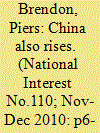

|
|
|
| 5 |
ID:
118660
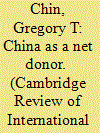

|
|
|
|
|
| Publication |
2012.
|
| Summary/Abstract |
The article examines China's emergence over the past decade as a net donor, and the implications of this status in global development. The analysis begins by outlining China's rise as a net donor, drawing comparisons in two-way aid flows with the other rising states, specifically Brazil, South Africa and India, and then turns to the implications of China's rise as an aid sender. The central argument is that conceptualizing China's rise as a 'net donor' is crucial for understanding the hybrid position that China has come to occupy in the global aid system, and the consequences of this positioning. Although China has achieved remarkable success with its own development, rather than join the Organization for Economic Cooperation and Development's Development Assistance Committee (DAC) regime of traditional donors, the Chinese Communist Party and government leadership has chosen instead to continue to self-identify with the countries of the South, and to construct ties of South-South cooperation outside of DAC arrangements. The Chinese leadership is trying to stake out an unprecedented position in the global aid system, traversing the North-South divide, despite the fact that China has already joined the ranks of world economic powers.
|
|
|
|
|
|
|
|
|
|
|
|
|
|
|
|
| 6 |
ID:
155019
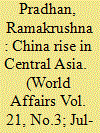

|
|
|
|
|
| Summary/Abstract |
The fight for hegemony in Central Asia is age old and the new Belt and Road Initiative has dramatically underscored the region’s strategic value to the West and opened up a bonanza for Chinese economic, political and security interests. Ramakrushna Pradhan analyses China’s emergence and interests in Central Asia and the implications for future developments in the region. He also explores the possibility of the Belt and Road Initiative becoming the new lever of the balance of power in Eurasia.
|
|
|
|
|
|
|
|
|
|
|
|
|
|
|
|
| 7 |
ID:
140312
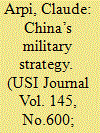

|
|
|
| 8 |
ID:
175838
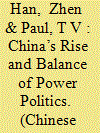

|
|
|
|
|
| Summary/Abstract |
The post-Cold War international system, dominated by the United States, has been shaken by the relative downturn of the US economy and the simultaneous rise of China. China is rapidly emerging as a serious contender for America’s dominance of the Indo-Pacific. What is noticeable is the absence of intense balance of power politics in the form of formal military alliances among the states in the region, unlike state behaviour during the Cold War era. Countries are still hedging as their strategic responses towards each other evolve. We argue that the key factor explaining the absence of intense hard balancing is the dearth of existential threat that either China or its potential adversaries feel up till now. The presence of two related critical factors largely precludes existential threats, and thus hard balancing military coalitions formed by or against China. The first is the deepened economic interdependence China has built with the potential balancers, in particular, the United States, Japan, and India, in the globalisation era. The second is the grand strategy of China, in particular, the peaceful rise/development, and infrastructure-oriented Belt and Road Initiative. Any radical changes in these two conditions leading to existential threats by the key states could propel the emergence of hard-balancing coalitions.
|
|
|
|
|
|
|
|
|
|
|
|
|
|
|
|
| 9 |
ID:
140824
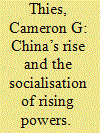

|
|
|
|
|
| Summary/Abstract |
The rise of China, and other states whose material power and ideational aspirations have outpaced that of their peers, presents an interesting challenge to international relations theorists. Structural theories rooted in realism tend to predict that changes in material power inexorably lead to conflict that reshuffles the pecking order at the pinnacle of the international system. Such theories also tend to ignore identity and other ideational factors that may condition the interaction of rising and dominant great powers. This article develops a theoretical approach to state socialisation of rising powers. While considering the importance of increasing material capabilities, this approach also examines the types of roles that states occupy in the international social system and the ability of great powers to socialise rising powers into what they consider to be appropriate roles. The 1995–1996 Taiwan Straits Crisis is analysed through this theoretical framework to demonstrate that although both China and the United States attempted to altercast each other in a socialisation process, neither was successful. China pursued its own, self-conceived role conceptions in the situation, as did the United States, setting the stage for renewed rivalry between the two powerful states. The case demonstrates the difficulty of constraining rising powers’ aspirations when their material power allows them to pursue the identities of their choice, even in the face of strong socialisation efforts from the dominant power and its supporters.
|
|
|
|
|
|
|
|
|
|
|
|
|
|
|
|
| 10 |
ID:
105489
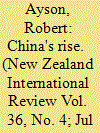

|
|
|
| 11 |
ID:
149584
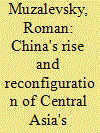

|
|
|
|
|
| Publication |
New Delhi, Alpha Editions, 2016.
|
| Description |
xiv, 116p.pbk
|
| Standard Number |
9789385505959
|
|
|
|
|
|
|
|
|
|
|
|
Copies: C:1/I:0,R:0,Q:0
Circulation
| Accession# | Call# | Current Location | Status | Policy | Location |
| 058922 | 327.151058/MUZ 058922 | Main | On Shelf | General | |
|
|
|
|
| 12 |
ID:
100874
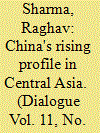

|
|
|
| 13 |
ID:
141283
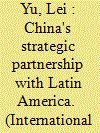

|
|
|
|
|
| Summary/Abstract |
China has over the last two decades been committed to creating a strategic partnership with Latin American states by persistently extending its economic and political involvement in the continent. China's efforts in this regard reflect not only its desire to intensify its economic cooperation and political relations with nations in Latin America, but also its strategic goals of creating its own sphere of influence in the region and enhancing its ‘hard’ and ‘soft’ power in order to elevate China's status at the systemic level. With access to Latin American markets, resources and investment destinations, China may sustain its economic and social progress that bases its long cherished dream of restoring its past glory of fuqiang (wealth and power) and rise as a global power capable of reshaping the current world system. The enormous economic benefits deriving from their economic cooperation and trade may persuade Latin American nations to accept the basic premise of China's economic strategy: that China's rise is not a threat, but an opportunity to gain wealth and prosperity. This will help China gain more ‘soft’ power in and leverage over its economic partners in Latin America, and thereby help it to rise in the global power hierarchy.
|
|
|
|
|
|
|
|
|
|
|
|
|
|
|
|
| 14 |
ID:
097380
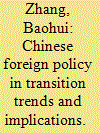

|
|
|
| 15 |
ID:
102962
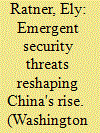

|
|
|
| 16 |
ID:
119243
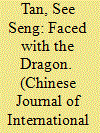

|
|
|
|
|
| Publication |
2012.
|
| Summary/Abstract |
How Asian countries relate strategically with rising China remains one of the most debated questions in Asian security today. Although the concomitant rise of regional powers (China, Japan, and India) has undoubtedly shaped, and continues to shape, the geopolitical milieu of post-Cold War Asia, it is the perceived emergence of China as an economic and military power that has nonetheless engendered most concern among Asian countries, not least Singapore. Analysts, however, disagree over how Asians perceive and respond to China's rise. One view, for example, has it that Asian countries have opted to bandwagon with China (as vassal states once did with imperial China);1 another that Asian states on the whole have demonstrated a greater inclination towards balancing China.2 A third view adopts the via media in suggesting that aspects of both bandwagoning and balancing can in fact be discerned in the behaviour of Asian states.3 Smaller and/or weaker Asian countries accordingly 'hedge'4 against China and other major powers as they manage their respective vulnerabilities and dependencies vis-à-vis those more powerful than they.5
|
|
|
|
|
|
|
|
|
|
|
|
|
|
|
|
| 17 |
ID:
097309
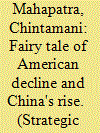

|
|
|
| 18 |
ID:
114900
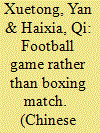

|
|
|
|
|
| Publication |
2012.
|
| Summary/Abstract |
Shortly after US President Obama and Australian Prime Minister Julia
Gillard sealed the bilateral defense deal in November 2011 under which
2500 US marines will be stationed in Australia came Obama's announcement on January 5 2012 of the new strategic defense guidance entitled
Sustaining U.S. Global Leadership: Priorities for the 21
st
Century Defence.
The document claims that China's rise might have impact on the US economy and security, and that countries such as China and Iran continue to
pursue asymmetric means of countering US power projection capabilities.
1
Both the Chinese Ministry of Foreign Affairs and the Ministry of Defense
refuted these claims, arguing that not a shred of evidence exists to support
such wild accusations.
2
Many media reports nevertheless argue that competition between the United States and China amounts to a new Cold War.
|
|
|
|
|
|
|
|
|
|
|
|
|
|
|
|
| 19 |
ID:
178080
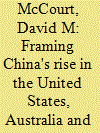

|
|
|
|
|
| Summary/Abstract |
Optimism about China's rise has in recent years given way to deep concern in the United States, Australia and the United Kingdom. Drawing on an original set of interviews with China experts from each country, and an array of primary and secondary sources, I show that shifting framings of China's rise reflect the dynamics of the US, Australian and UK national security fields. The article highlights three features specifically: first, the US field features a belief that China's rise can be arrested or prevented, absent in Australia and the UK. I root this dynamic in the system of professional appointments and the intense US ‘marketplace of ideas’, which gives rise to intense framing contestation and occasional sharp frame change. I then identify the key positions produced by each field, from which key actors have shaped the differing interpretations of China and its meaning. The election of Donald Trump, a strong China-critic, to the US presidency empowered key individuals across government who shifted the predominant framing of China from potential challenger to current threat. The smaller and more centralized fields in Australia and Britain feature fewer and less intense China-sceptical voices; responses have thereby remained largely pragmatic, despite worsening diplomatic relations in each case.
|
|
|
|
|
|
|
|
|
|
|
|
|
|
|
|
| 20 |
ID:
099372
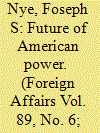

|
|
|
|
|
|
|
|